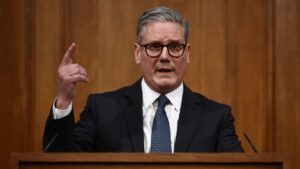Scotland axes universal winter fuel payments for pensioners
Social Justice Secretary Shirley-Anne Somerville announced the move on Wednesday and said ministers had been left with “no choice” due to cuts made by the UK government.

The Scottish government has confirmed it will no longer provide winter fuel payments to all pensioners.
The once universal benefit will now be means-tested and replicate a UK government decision.
The introduction of a replacement Scottish benefit has also been delayed.
It comes amid reports that Finance Secretary Shona Robison has written to cabinet colleagues and ordered them to freeze all unnecessary spending to help pay for public sector pay deals.
Social Justice Secretary Shirley-Anne Somerville announced the move on Wednesday and said ministers had been left with “no choice” due to the cuts made south of the border.
In July, Chancellor Rachel Reeves revealed the payment – worth between £100 and £300 – would be means-tested in England and Wales, where only those on benefit will qualify.
It is expected to reduce the number of pensioners in receipt of the payment from 11.4 million to 1.5 million, saving the Treasury some £1.4bn this financial year.
The payment is a devolved matter in Scotland and Northern Ireland, however the UK government’s approach is expected to cause up to a £160m cut to Scottish funding in 2024-25.
The Scottish government had intended to replace the winter fuel payment this year with its own Pension Age Winter Heating Payment (PAWHP).
That has now been delayed until 2025-26, with Ms Somerville claiming the anticipated cuts amount to as much as 90% of the PAWHP funding.
The Scottish government said initial analysis suggests the caseload in Scotland will decrease by around 900,000 in 2024-25 based on current pension credit uptake, and will now support up to 130,000 people in receipt of pension credit and other means-tested benefits.
Ms Somerville said: “Despite all efforts to review our financial position we have been left with no choice but to follow the UK government and restrict payments to older people who receive relevant eligible benefits.
“This is a necessary decision when faced with such a deep cut to our funding and in the most challenging financial circumstances since devolution.”
Read more from Sky News:
Unions suspend planned Scottish bin strikes after new pay offer
Liz Truss storms off stage after lettuce banner prank

Keep up with all the latest news from the UK and around the world by following Sky News
Meanwhile, Government Expenditure and Revenue Scotland (Gers) figures revealed the nation’s public spending deficit increased from £18bn in 2022-23 to £22.68bn in 2023-24 due to lower North Sea revenue.
As a percentage of Scotland’s GDP, the deficit has increased from 8.4% to 10.4%, compared to the UK deficit which fell from 5% to 4.5% in the same period.
Total revenue increased in Scotland from £86.8bn to £88.5bn.
Government expenditure per person in Scotland is £2,417 higher than the rest of the UK, with £20,418 spent on average for every single person north of the border.
Finance Secretary Ms Robison claimed the deficit is “not a reflection on the finances or policies of the Scottish government – it is a reflection of UK government choices”.
She said the Scottish government will make sure public services do not “crumble away”, adding: “Our priority is clear in making sure that we sustain public services, that we continue to tackle poverty and that we continue to invest in net zero and transforming our economy – those are our key priorities.
“But we will have to decide what we deprioritise, and that work is ongoing.”
Ms Robison also raised the possibility of a reduction in the public sector workforce and said there is “absolutely going to be restraint on recruitment”.
Be the first to get Breaking News
Install the Sky News app for free


The MSP for Dundee City East cited her letter to cabinet colleagues, saying only recruitment in critical areas – like blue light services – will be allowed to move forward.
The Scottish government will work with the public sector, she said, to pinpoint what “voluntary options” are available in light of the policy of not allowing compulsory redundancies.
The UK government has been contacted for comment.


